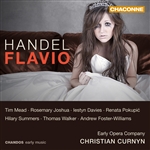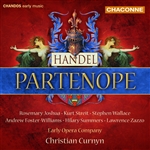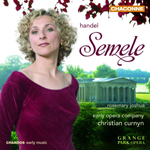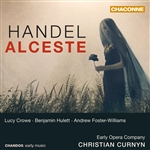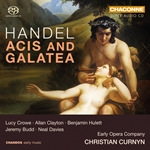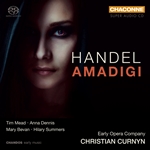GEORGE FRIDERIC HANDEL
(1685-1759)
Flavio, Re de' Longobardi, HWV 16 (1723)
146:23
Opera in Three Acts
Libretto by Nicola Haym after Il flavio Cuniberto by Matteo Noris
Performing edition prepared by Peter Jones
Act I
Scene I
2.
2
Recitativo. Vitige. 'Fra i ciechi orror' notturni'
0:42
with Teodata
3.
3
Duetto. Vitige and Teodata. 'Ricordati, mio ben'
4:29
Scene II
5.
5
Recitativo. Ugone. 'Lotario, al sacro nodo' -
1:46
with Lotario, Guido, Teodata
Scene III
Recitativo. Emilia. 'Con l'alma reverente'
with Guido, Ugone, Lotario, Teodata
6.
6
Aria. Emilia. 'Quanto dolci, quanto care'
3:48
Scene IV
7.
7
Recitativo. Guido. 'Son pur felice al fine'
0:25
8.
8
Aria. Guido. 'Bel contento già gode quest'alma'
5:27
Scene V
9.
9
Recitativo. Ugone. 'O dell'Italo soglio, eccelso nume'
1:35
with Flavio, Teodata
10.
10
Aria. Teodata. 'Benchè povera donzella'
5:19
Scene VI
11.
11
Recitativo. Lotario. 'Della mia prole Emilia' -
2:13
with Flavio, Vitige
Scene VII
Recitativo. Ugone. 'Di qual sovrano e riverito impero'
with Flavio, Lotario
12.
12
Aria. Lotario. 'Se a te vissi fedele'
3:03
Scene VIII
13.
13
Recitativo. Flavio. 'Vitige!'
0:45
with Vitige
14.
14
Aria. Flavio,. 'Di quel che m'innamora'
2:49
Scene IX
15.
15
Recitativo. Vitige. 'Io vo temendo, O Dio'
0:15
16.
16
Aria. Vitige. 'Che bel contento'
2:53
Scene X
17.
17
Recitativo. Ugone. 'Ah! Guido, Guido!' -
2:03
with Guido
Scene XI
Recitativo. Guido. 'Amor, Emilia, onore'
18.
18
Aria. Guido. 'L'armellin vita non cura'
5:06
Scene XII
19.
19
Recitativo. Emilia. 'Guido? Consorte?' -
2:12
with Guido
Scene XIII
Recitativo. Emilia. 'Chi mai l'intende, Oh Dio!'
20.
20
Aria. Emilia. 'A mante stravagante'
3:47
Act II
Scene I
21.
21
Recitativo. Teodata. 'Al tuo cenno reale ubbidiente' -
2:36
with Flavio
Scene II
Recitativo. Ugone. 'Dove, dove mi celo?' -
with Flavio, Teodata
Scene III
Recitativo. Ugone. 'Ah! Teodata, Teodata!'
with Teodata
22.
22
Aria. Ugone. 'Fato tiranno e crudo'
2:56
Scene IV
23.
23
Recitativo. Emilia. 'Dunque per le mie nozze'
0:30
with Lotario
24.
24
Aria. Lotario. 'S'egli ti chiede affetto'
3:28
Scene V
25.
25
Recitativo. Emilia. 'Che mai chiedete, o stelle'
1:29
with Guido
26.
26
Aria. Emilia. 'Parto, sì; ma non so poi'
7:01
Scene VI
27.
27
Recitativo. Guido. 'Privarmi ancora'
0:23
28.
28
Aria. Guido. 'Rompo i lacci, e frango i dardi'
5:00
1.
29
Recitativo. Flavio. 'Di Teodata assai men vago splende'
0:55
2.
30
Aria. Flavio. 'Chi può mirare'
3:46
3.
31
Recitativo. Vitige. 'Teodata!'
1:04
4.
32
Aria. Teodata. 'Con un vezzo, con un riso'
4:36
5.
33
Recitativo. Vitige. 'Amo, e quel ben ch'adoro'
0:40
6.
34
Aria. Vitige. 'Non credo instabile'
4:55
7.
35
Recitativo. Lotario. 'Io deluso? Lotario? ed altri miete' -
3:10
8.
36
Aria. Emilia. 'Ma chi punir desio?'
6:33
9.
37
Recitativo. Flavio. 'Alma, tu non m'intendi'
1:28
10.
38
Aria. Emilia. 'Da te parto; ma concedi'
4:31
11.
39
Recitativo. Flavio. 'Guido, Lotario uccise?'
1:06
12.
40
Arioso e recitativo. Vitige. 'Corrispondi a chi ti adora'
2:15
13.
41
Aria. Falvio. 'Starvi accanto e non languire'
3:20
14.
42
Recitativo. Vitige. 'Barbara Teodata'
0:18
15.
43
Aria. Teodata. 'Che colpa è la mia'
4:13
16.
44
Reictativo. Vitige. 'Del nuovo amante, e dell'impero accesa'
0:43
17.
45
Aria. Vitige. 'Sirti, scogli, tempeste, procelle'
3:34
18.
46
Accompagnato. Emilia. 'O Guido, o mio tiranno!' -
2:56
19.
47
Aria. Guido. 'Amor, nel mio penar'
6:18
20.
48
Recitativo. Teodata. 'Vitige!' -
3:01
21.
49
Duetto. Guido. 'Deh, perdona, o dolce bene'
6:37
22.
50
Recitativo. Flavio. 'E tu, Vitige, in pena'
0:37
23.
51
Coro. 'Doni pace ad ogni core'
2:31
Solo: Tim Mead counter-tenor - Flavio
Solo: Iestyn Davies counter-tenor - Guido
Solo: Hilary Summers contralto - Teodata
Solo: Renata Pokupic mezzo-soprano - Vitige
Solo: Thomas Walker tenor - Ugone
Solo: Andrew Foster-Williams bass-baritone - Lotario
Orchestra: Early Opera Company
Conductor: Christian Curnyn
















 My Wish List
My Wish List

